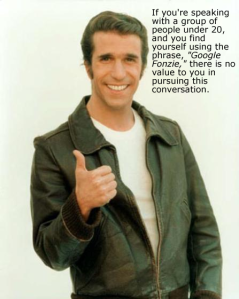This article with video from ‘Good To Great’ author Jim Collins identifies three primary employee
demotivators.
Actually, he doesn’t limit them to employees but rightly says they are
inflicted on people in many forums. Parents especially are noted as
perpetrators. Those three demotivators are:
- hype
- futurism and
- false democracy.
There may be others but these three are good ways to put out the
fires that might be burning inside people you have who are already
inherently motivated. Crazy. You’d think that employers would want to
not do that, yet I see an awful lot of hype, futurism and false
democracy in a lot of workplaces. All of it is well-intentioned.
In one of my previous management roles where I was a significant
agent of change, I had a little personal catchphrase, “No fireworks, no
bugles.” What I was trying to reinforce to myself and to others was my
own anti-hype position. I really did not want to overpromise. I’d
learned from being on the receiving end of too many projects or ideas
that were going to magically transform everything into a wonderland of
worker amenity and prosperity. Never quite panned out quite as
wonderlandy as they painted it. Few things do. Honestly, I’m not
anti-hype. It has its place. Used in short bursts at appropriate times,
it can generate heat, energy, attention, focus and movement. My problem
is that, often, the hype is all there is. In fact, isn’t that the
meaning most of us apply when we see, hear or use the word? Too much
hype. Nothing but hype. Over-hyped. Don’t believe the hype. What must
follow hype to avoid demotivation is prompt and positive change of
meaningful substance.
Workplace examples of death by overhyping I’ve seen have included
introductions of performance management systems and departmental
restructures. That said, I’ve also been involved in introductions of
performance management systems and departmental restructures that were
highly successful, well received and used hype, to some extent, very
well. So, I’d disagree with Collins if he means that all hype is bad. I
suspect he doesn’t mean that. I believe he means the hyperbole that
isn’t followed up with action of substance. Far better to, as he says in
the video, “…to confront the brutal facts.”
How is futurism bad? I thought we were all meant to be planning for
the future, setting goals, anticipating and pre-solving problems etc?
Once again, Collins isn’t slamming all futurism, merely those bosses who
focus on
nothing but the future with little or zero emphasis
on the now or recent history. Those bosses can’t learn from mistakes,
can’t celebrate successes and can’t leverage employees ‘in the zone’ or
in ‘a state of flow.’ These high performers don’t ignore the future but
when they’re at their most productive, they are very much solely in the
now. Bosses who break that focus and drift off over the rainbow are
counter-productive.
Collins says to show results as an indication of progress, to show
that people are part of something that is actually working. He refers to
this as ‘clicks on the flywheel.’ (I get what he’s saying but will
admit to having to go look up what a flywheel is – a heavy disk or wheel
rotating on a shaft so that its momentum gives almost uniform
rotational speed to the shaft and to all connected machinery. I’m
pedantic enough to argue that change never happens at a ‘uniform
rotational speed’ and I don’t even like the metaphor’s ‘rotational’
representation of change. But I still get it and love the whole point of
it which was the benefits of showing progress and being part of
something that works!)
False democracy is a label for all the actions by those employers who
have already made up their mind but would like to paint over their
intentions with a thin veneer of dishonest inclusiveness by engaging in
some token campaign of capturing ideas and inputs from the team. Not
that anything ever amounts from these campaigns. This is worse than just
being a blatant autocracy. At least that’s honest and transparent.
Sometimes even well-meaning managers will engage in such a campaign even
though the system of their workplace is so rigid and unresponsive that
actual democracy is unlikely. That might be worse as it raises false
hope?
Doctors have their oath and the first part is about at the very least
not doing harm. Leaders, when it comes to motivating their people,
could, at the very least, take that page out of the doctors’ book.
(Don’t take a page out of their prescription pad though. You’ll never
read their handwriting!)





